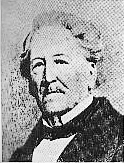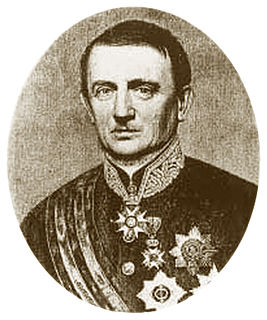
The Fontaine Ministry formed the government of Luxembourg from 1 August 1848 to 2 December 1848.

The Fontaine Ministry formed the government of Luxembourg from 1 August 1848 to 2 December 1848.
After the Constitution came into force on 1 August 1848, the first elections to the Chamber of Deputies were organised on 28 September. [1] This had only become possible after popular unrest had broken out under governor Gaspard-Théodore-Ignace de la Fontaine in March 1848. On 15 March, the government and King-Grand-Duke William II sought conciliation with the people. [2] Censorship was abolished, and a Constituent Assembly was called in Ettelbrück, which was to draft a new constitution. The text of the new constitution, which was modeled on the liberal Belgian constitution, was adopted on 23 June.
After the elections, de la Fontaine, Vendelin Jurion, Charles-Mathias Simons and Jean Ulveling were retained as members of the government; Théodore Pescatore resigned and was replaced with Jean-Pierre André. [2]
The members of the new government received new titles: de la Fontaine was appointed President of the Government Council, and his "ministers" now had the title of "Administrator general". [2]
The new constitution allowed the Chamber to exercise a great deal of control over the government. The government had to account for its actions in the Chamber, the Acts of the King-Grand-Duke were counter-signed by the government (which therefore took responsibility for them) and the Chamber voted on the budget. [2]
De la Fontaine had only a slim majority in the Chamber. [1] Especially the Liberals mistrusted him. Domestically, two issues predominated in this period: the law on communes (23 October), which established limits on the communes' autonomy and government control, and the naturalisation law (12 November), which caused the government to lose confidence in the Chamber, due to which it had to resign on 2 December 1848. [3]
The de la Fontaine government tried to bring about a strong integration in the German Confederation, fearing revolutionary influences from France and Belgium. The government, against the wishes of public opinion, took an active part in German politics, and even supported the decision of the Constituent Assembly to send Luxembourgish delegates to the short-lived Diet of Frankfurt, where they debated over German unity. [3]

Gaspard-Théodore-Ignace de la Fontaine was a Luxembourgish politician and jurist. He led the Orangist movement and was the first Prime Minister of Luxembourg, serving for four months, from 1 August 1848 until 6 December of the same year.
Charles-Mathias Simons was a Luxembourg politician and jurist. He was the third Prime Minister of Luxembourg, serving for seven years, from 1853 until 1860.

Baron Victor de Tornaco was a Luxembourg politician. An Orangist, he was the fourth Prime Minister of Luxembourg, serving for seven years, from 26 September 1860 until 3 December 1867.

The Ministry of Foreign Affairs is a ministry of the government of Luxembourg, headquartered in the Bâtiment Mansfeld in Luxembourg City.
François-Xavier Wurth-Paquet was a Luxembourgian politician, jurist, and archaeologist.

Vendelin Jurion was a Luxembourgish politician and jurist.
Jean-Joseph Norbert Metz was a Luxembourgish politician and engineer. With his two brothers, members of the powerful Metz family, Charles and Auguste, Metz defined political and economic life in Luxembourg in the mid-nineteenth century.
The Constituent Assembly of Luxembourg was a constituent assembly called in 1848 in Luxembourg to write and pass a new national constitution.
Théodore Pescatore was a Luxembourgian politician. One of the most important liberals in the mid-19th century, he was president of the Constituent Assembly that wrote Luxembourg's Constitution in 1848. He later held the position of President of the Chamber of Deputies for two years.
Jean Ulveling was a Luxembourgian statesman, politician, and historian. He served as a member of the Council of State of Luxembourg for some years, and was a member of the Constituent Assembly which framed a new constitution in 1848. From 1854 to 1856 he represented the canton of Wiltz in the Chamber of Deputies.

The Tornaco Ministry was in office in Luxembourg from 26 September 1860 until 3 December 1867. It was reshuffled six times.
François Joseph Albert Léon de la Fontaine,, was a Luxembourgish lawyer, politician and botanist.
The Loutsch Ministry was in office in Luxembourg from 6 November 1915 to 24 February 1916.

The Servais Ministry was in office in Luxembourg from 3 December 1867 to 26 December 1874. It was reshuffled four times.
The Simons Ministry was in office in Luxembourg from 23 September 1853 to 26 September 1860. Initially it just consisted of three members of the government, to which two more were added on 23 September 1854.

The Willmar Ministry was in office in Luxembourg from 2 December 1848 to 23 September 1853.

The Eyschen Ministry was in office in Luxembourg for 27 years, from 22 September 1888 to 12 October 1915, when Paul Eyschen died.
The Revolution of 1848 in Luxembourg was part of the revolutionary wave which occurred across Europe in 1848. The Grand-Duchy of Luxembourg at that time was in personal union with the Kingdom of the Netherlands.
Freemasonry in Luxembourg traces its local origins to the 18th century. Though the practice of Freemasonry was suppressed by the reigning Austrian Habsburg dynasty, it enjoyed a revival under Napoleonic rule that persisted after the close of his reign. After their initial founding, Masonic lodges in Luxembourg rapidly developed strong ties with their French and Belgian counterparts. While suppressed again under Nazi rule, postwar Freemasonry forged stronger ties with the Anglo-American extension of the brotherhood, though the oldest lodges still use the French form of Masonic ritual.